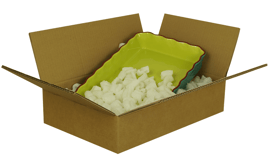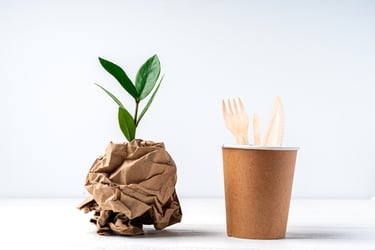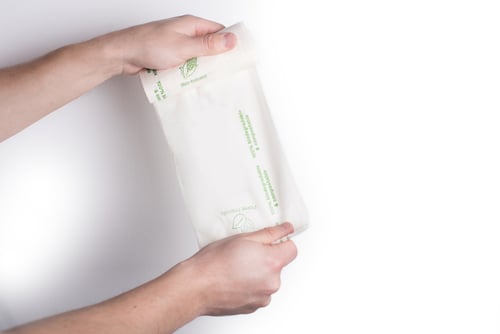
In our quest for a more sustainable future, one area that has gained significant attention is packaging - both in terms of reusability and waste management performance. Packaging materials, often criticised for their environmental impact, are now being reimagined to reduce their carbon footprint. Among the innovative solutions gaining traction is biodegradable packaging. Today, we'll dive into the world of biodegradable packaging materials, highlighting their importance and the environmental benefits of biodegradable packing options.
Mapping Sustainability Practices: Biodegradability and the Packaging Landscape
Biodegradable packaging is a significant step towards addressing the issues of waste and pollution that conventional packaging materials like plastic pose. These materials break down naturally into harmless components when exposed to environmental conditions, leaving behind minimal or no trace.
Common Materials for Biodegradable Packaging
Biodegradable packaging materials are diverse, each offering unique advantages. Here are some of the most common materials used in biodegradable packaging:
Biodegradable Plastics
These plastics, derived from renewable sources like cornstarch or sugarcane, have gained popularity for their ability to decompose faster than traditional plastics. They can be used for various applications, including packaging for food, textiles, and personal care products.
Paper and Cardboard
Traditional materials like paper and cardboard are readily biodegradable. They can be sourced from sustainably managed forests and are suitable for packaging a wide range of goods, from electronics to clothing.
Mushroom Packaging
This innovative packaging material is made from mycelium, the root system of fungi. It's not only biodegradable but also compostable, making it an excellent choice for reducing waste. Mushroom packaging can be moulded into various shapes and sizes, offering versatility in design.
Biodegradable Films
Thin films made from materials like polylactic acid (PLA), derived from cornstarch or sugarcane, are used for items like food packaging and disposable tableware. They are transparent, heat-resistant, and can be composted, reducing the burden on landfills.
New Innovations in Sustainable Packaging
Grass Document Labels as a Sustainable Shipping Alternative
Document labels are a crucial part of packaging and branding - and grass document labels serve as an eco-friendly alternative to traditional plastic and paper-based labels. These labels are derived from grass fibres, which are renewable and biodegradable. They offer the same level of functionality and print quality as traditional labels while significantly reducing their environmental footprint.
Micafil for Hazardous Chemical Containers
For hazardous chemical containers, such as bleach, micafil is the ideal choice. Made from a large-grade vermiculite in a 100-litre bag, micafil produces excellent cushioning and insulation for chemicals, ensuring their safe transport while being environmentally friendly. Its biodegradable properties mean that it can break down naturally, reducing waste and environmental impact.
The Environmental Benefits of Biodegradable Void-Fill
Void-fill materials play a crucial role in securing products during shipping and reducing damage. One notable biodegradable void-fill product is biofil Biodegradable Loosefill. These easy-to-use packing peanuts are designed to cushion your items while also being kind to the environment.
biofil loosefill is engineered for rapid biodegradability, ensuring it won't linger in landfills or oceans like traditional packaging materials. Moreover, its non-toxic decomposition process means that as Biofil breaks down, it releases no harmful chemicals, ensuring it doesn't harm the ecosystem during decomposition. What's more, these void-fill peanuts are made from renewable resources, primarily maize starch, further reducing their environmental impact.
Driving Sustainable Practices Across Industries
Reducing Plastic Pollution
The adoption of biodegradable packaging promises transformative changes in various sectors and among consumers, positively impacting both domestic and commercial practices in the future. Biodegradable materials break down naturally, offering a promising solution to plastic pollution, particularly in oceans and landfills. By choosing biodegradable packaging, we can significantly reduce the threat of plastic pollution, preserving marine life and delicate ecosystems.
Lower Carbon Footprint
The production of biodegradable materials often carries a lower carbon footprint compared to traditional plastics. This means that from the manufacturing process to disposal, biodegradable packaging generates fewer greenhouse gas emissions. In doing so, it contributes to the broader effort to mitigate climate change and reduce our ecological footprint.
Encouraging Eco-Friendly Choices
As biodegradable packaging becomes more accessible and affordable, consumers and businesses are increasingly inclined to make eco-friendly choices. This shift in preference not only supports sustainable practices but also fosters a culture of environmental responsibility. It encourages us all to be more mindful of our packaging choices and their impact on the planet.
Meeting Regulatory Demands
Governments worldwide are intensifying their focus on environmental regulations and standards. Likewise, consumers are becoming more conscious of sustainable products and packaging. Businesses that embrace biodegradable materials are not only aligning with regulatory demands but are also better positioned for market competitiveness. This proactive approach not only satisfies legal requirements but also demonstrates a commitment to sustainable business practices, attracting environmentally conscious consumers.
Transitioning to Greener Packaging
Biodegradable packaging materials offer a promising path toward a more sustainable and eco-conscious future. By making the switch to these materials, we can collectively reduce our impact on the environment, conserve natural resources, and promote responsible practices across various industries.
For information on how Allpack can assist you in boosting your packaging sustainability and reducing your environmental impact, reach out to us today. You can easily get in touch by sending a message or emailing sales@allpack.uk.com to transition to more sustainable practices for good.
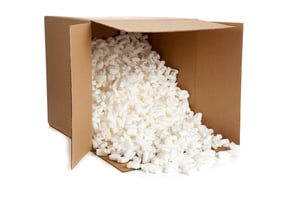
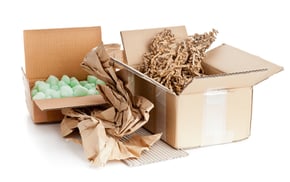
%20.png?width=225&height=225&name=Large%20grade%20Vermiculite%20(micafil)%20.png)
